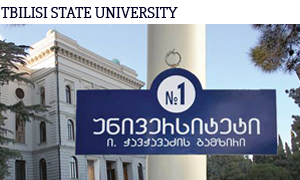
FACULTY OF LAW
THE EUROPEANIZATION OF GEORGIA’S NATIONAL SECURITY
Security issues are becoming increasingly significant in today’s world, and on its way to European integration Georgia should carefully consider the strengths and weaknesses of its own national security and its compatibility with European security concepts.
To this end, research on “The Europeanization of Georgia’s National Security” was carried out by Lela Janashvili, Associate Professor and Head of Internationalization and Scholarly Research Department at the TSU Faculty of Law. This research was supported by the Open Society Foundation within the framework of the Global Faculty Grants Program in 2013-2014. It was undertaken at the PublicLaw and Political Science Department of the Autonomous University of Barcelona, Spain. Joan Lluís Pérez Francesch, Head of the Constitutional Law Department and of the research group “Freedom, democracy and the transformation of states”, supervised the project.
 “Safer Europe in a better world” is the motto of Europe’s first security strategy adopted on December 12, 2003. According to Lela Janashvili, with the help of Europe’s security strategy the EU believes that adapting its strategy to existing realities will help tackle significant global issues like terrorism;the spread of weapons of mass destruction; weak states; organized crime; and regional conflicts. These are the prioritiesof the European security concept, which holds every state responsible for establishing its own security concept as a key characteristic of a modern constitutional state.
“Safer Europe in a better world” is the motto of Europe’s first security strategy adopted on December 12, 2003. According to Lela Janashvili, with the help of Europe’s security strategy the EU believes that adapting its strategy to existing realities will help tackle significant global issues like terrorism;the spread of weapons of mass destruction; weak states; organized crime; and regional conflicts. These are the prioritiesof the European security concept, which holds every state responsible for establishing its own security concept as a key characteristic of a modern constitutional state.
This is true for Georgia as well. National security is a very complex issue and should be examined acrossvarious dimensions; it includes other problematic issues that need to be carefully analysed. Today, Europe has to face challenges that did not exist in the 20th csuch as global terrorism, transnational crime, regional and armed crime, and intensified separatist tendencies.The concept of Georgian security is based on the analysis of a complex set of interests and events, internal and external security threats and challenges.
The researchwas carried out by applying a comparative legal method using European and Spanish security concepts. Throughout the project, Spanish experts organized several round tables where they talked about global security issues and the roles of states in this respect. Researchfindings include the experts’ conclusions (Professors: Joan Lluís Pérez Francesch, Thomas Hill Marquez, Manuel Balbe Malol, Roser Martinez and Montserrat Iglesias). According to them, the Georgian security concept is a “window’’ through which security issues can be analysed for small transitional countries within a harsh neighbourhood, i.e. when small countries must cope with larger and sometimes hostile neighbouring countries.In the case of Georgia, threats of regional conflicts in the region are particularly noteworthy and pose a danger to Europe as well, whether theyoccur on the EU territory or near its borders.
The present situation in this region – including cases of regional terrorism; unresolved conflicts between Armenia and Azerbaijan;an unstable balance of power and the constant risk of reoccurring wars;serious threats of destabilization at Georgia’s northern borders with Ingushetia, Dagestan, etc; and other visible or invisible threats—all indicate that Georgia must keep an efficient security system in place. Needless to say, a well-functioning security conceptenablesthe country to set the right priorities, while associating Georgian national security with Europe.

Open, large-scale military aggression carried out by the Russian Federation against Georgia in 2008 has made it clear that even in modern world such aggression remains the means of achieving political goals for some countries.
Research also addresses the part of a Georgian security concept that that was pertinent for the 2008 conflict. In August 2008 the Russian Federation’s open and large-scale military aggression against Georgia made it very obvious that even in today’s worldcertain states turn to hostility as a main way to achieve their goals. The August 2008 aggression, followed by the occupation of Georgian territory, thenthe occupation by Russian military forces and infrastructures on Georgian territories, allsignificantly deteriorated the security environment. This war made it perfectly clear thatthe Russian Federation has not acceptedthe sovereignty of the Georgian state.
According to the Spanish scholars, the main strength of a security concept is recognizing the fact that state security should not be dealt with only through military and diplomaticaction. Indeed peace entails economic development and interdependence, energy dependence and certain forms of internal governance. The main weakness of Georgia’s national security is its strong focus on political messages rather than on strategic analysis. Despite the number of its strengths, the concept creates illusory expectations.
The Spanish researchers divided the weaknesses of the present Georgian national security concept into internal and external threats. Internal threats include a lack of discussion on economic problems and political issues, a lack of strategy for sustainable economic growth, as well as poverty and unemployment. External weaknesses include a neglect of thevolatile environment in the Caucasus. The present concept does not properly address the possibilities for resolving relationships with neighbouring countries. According to this concept, the strategic environment of Georgia is linked to the country’s features,such as its small size and weaknesses, to political instability, the volatility of the region and its dependence on a global economy.
A new reality emergedwith the signing of the European Association Agreement, which will provide key suggestions for a comprehensive conceptto improveGeorgia’s democratic environment, concentrating on foreign diplomacy to resolve security issues with immediateneighbours, and tackling poverty and increasing employment. These suggestions will make the new Georgian security concept more viable and will contribute to the establishment of a stable state. The most significant tasks of modern constitutional statesareto maintain a democratic legal regime and protect the basic rights recognized and guaranteed by the Constitution. Today, by signing the Association Agreement, Georgia has made the European choice, a choice for civilization, a process in which we have been involved for centuries.
The research findings were presented at the Institute of Political and Social Sciences (http://www.icps.cat) on December 17, 2013 and issued in Spanish in the university’s online periodical: http://www.icps.cat/archivos/Workingpapers/wp325.pdf




